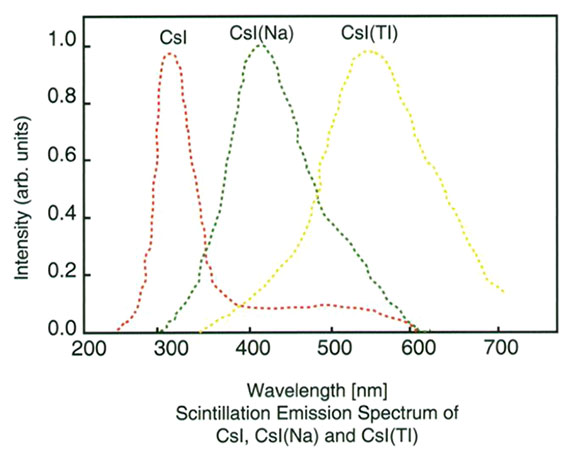Basic Properties:
| Density(g/cm3) | 4.51 | Melting Point (°C) | 621 |
| Cleavage Plane | None | Hardness(Mohs) | 2 |
| Hygroscopic | Yes | Refractive Index at Emission Peak | 1.84 |
| Emission Peak Wavelength (nm) | 420 | Lower Wavelength Cutoff (nm) | 300 |
| Decay Time (μs) | 0.63 | Light Yield (photons/Mev/γ) | 38~44x10^3 |
| Thermal Expansion Coefficient (K^-1) | 49x10^-6 | Photoelectron Yield (% of NaI(Tl) ) (γ-rays) | 85 |
| Afterglow (after 20ms) (%) | 0.5~5.0 |

Sodium doped Cesium Iodide, or CsI(Na) is one of the CsI scintillator variants. CsI(Na) has a broad emission spectrum, with an emission peak wavelength of 420nm, which is well matched to the spectral sensitivities of the bialkali photomultiplier (PMT). CsI(Na) is also a bright scintillator with a high light output just a bit lower than CsI(Tl) and a luminescence efficiency comparable to Na(I), while CsI(Na) exhibits a decay time of around 0.63 μs, faster than CsI(Tl), allowing for better timing applications. CsI(Na) has a high density (4.51 g/cm³) and effective atomic number (54), providing strong stopping power for gamma rays and X-rays. The distinct feature of CsI(Na) is that it has good thermal and mechanical robustness, CsI(Na) can remain very stable to temperature changes and therefore are excellent for applications in harsh environments, like well-logging, space research, etc. The drawback of CsI(Na) is that the light output of CsI(Na) drops drastically at lower energies. This can limit its effectiveness in detecting low-energy X-rays or soft gamma rays, which require alternative scintillators like CsI(Tl) or others optimized for such ranges. CsI(Na) is also more prone to absorbing moisture than CsI(Tl), this calls for the need for careful encapsulation.
Shanghai North Optics offers CsI(Na) custom scintillator crystals, polished and encapsulated CsI(Na) crystals are available. Grown using the eco-conscious Bridgman method, our sodium-doped CsI exhibits superior light output, and photoelectron yield that amounts to 85% of the value of Na(I). With state-of-the-art manufacturing techniques, we are capable of mass-producing large-size sodium-doped cesium iodide up to a maximum size of 100x100x400mm and even greater sizes. North Optics’s CsI(Na) crystals provide high deliver exceptional performance in applications like oil well logging, and geophysical and borehole logging. Complementary Photomultiplier Tubes (PMT) could be installed if requested.
Application Notes:
CsI, CsI(Tl), CsI(Na) Property Comparison Chart:
| Parameters | CsI(Tl) | CsI(Na) | CsI (Undoped) |
| Density | 4.51 | 4.51 | 4.51 |
| Melting Point (°C) | 621 | 621 | 621 |
| Thermal Expansion Coefficient (K^-1) | 54x10^-6 | 49x10^-6 | 49x10^-6 |
| Cleavage Plane | None | None | None |
| Hardness (Mohs) | 2 | 2 | 2 |
| Hygroscopic | Slightly | Yes | Slightly |
| Wavelenth of Emission Peak (nm) | 550 | 420 | 315 |
| Lower Wavelength Cutoff (nm) | 320 | 300 | 260 |
| Refractive Index at Emission Maximum | 1.79 | 1.84 | 1.95 |
| Decay Time (μs) | 1 | 0.63 | 0.016 |
| Afterglow (after 20ms) (%) | <0.5 (normal) | 0.5~5.0 | / |
| Light Yield (photons/Mev/γ) | 52~56x10^3 | 38~44x10^3 | 2x10^3 |
| Photoelectron Yield (% of NaI(Tl)) (γ-rays) | 45 | 85 | 4~6 |